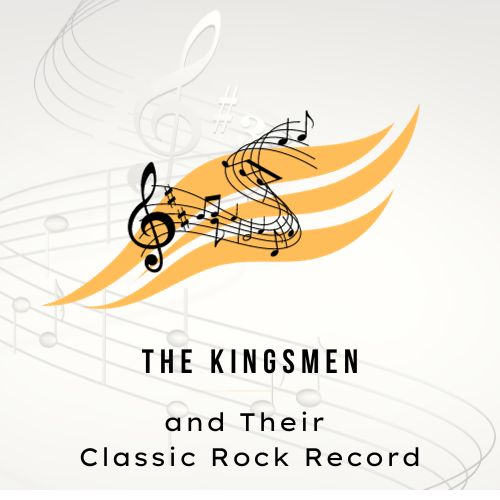Who are the Kingsmen?
The Kingsmen are a garage rock band in the 1960s mainly famous for their 1963 hit “Louie Louie.” Their other hits include “Money (That’s What I Want)” and “The Jolly Green Giant.” Just before the success of “Louie Louie,” the core band members began to drift apart. Lynn Easton declared himself as lead vocalist, which forced other members Jack Ely and Bob Nordy to leave the band; Don Gallucci eventually quit as well. Easton forged on using the “Kingsmen” name that was accorded to his legal rights. Ely later formed his own band, Jack Ely and the Courtmen, before plunging into obscurity, while Gallucci founded his own group Don and the Goodtimes.
The Kingsmen and their biggest contribution to rock music – “Louie, Louie”
The Kingsmen are an American garage rock and rock and roll band, formed in Portland, Oregon in 1959. The original lineup consisted of vocalist and guitarist Jack Ely, lead guitarist Mike Mitchell, bassist Bob Nordy, keyboardist Don Galucci and drummer Lynn Easton.
The Kingsmen are now known for covering Richard Berry’s 1957 rock and roll single “Louie, Louie.” The Kingsmen’s rendition has been the most famous of all the other versions, before or since (including Berry’s original).
“Louie, Louie” — the making of the classic rock record
It was in 1962 where the band decided to play “Louie, Louie” after hearing the Rockin’ Robin Roberts’s version of the song over the jukebox. Leader Jack Ely later taught to his bandmates in playing the song, unaware that he made the mistake in changing the song’s rhythm. Instead of the Rockin’ Robin Roberts and his band The Wailers’ version which had the basic “1-2-3-4, 1-2, 1-2-3-4, 1-2” beat, Ely showed his mates to play it in a “1-2-3, 1-2, 1-2-3, 1-2” beat. But that error would later make up of the song’s enduring popularity.
The Kingsmen began to play “Louie, Louie” at dance parties in a club owned by radio host Ken Chase, who later became the band’s manager. Further seeking to cash in on “Louie, Louie”‘s popularity, Chase booked the Kingsmen into an hour-long recording session for the next day.
The Kingsmen walked into a small, primitive recording studio with only three microphones. The band jointly paid the entire session with $50. With one of the mikes suspended ten feet above, Ely had to literally shout the lyrics in order to be heard. In what the Kingsmen thought to be a just a practice, the song was recorded in its first and only take. That was something which the band was not too happy about, but their manager Chase otherwise enjoyed the rawness of the sound.
“Louie, Louie”‘s slow rise to the charts
“Louie, Louie” was released as a single on a local label in 1963. Initially, the response was underwhelming as another version by a rival group Paul Revere & the Raiders took a lion’s share of the regional market. Interestingly, the Raiders’ version was undoubtedly more polished in execution, considering that it was also recored at the same studio where the Kingsmen cut their own version.
But soon the Kingsmen’s version of “Louie, Louie” took the country by storm, eventually peaking at #2 on the Billboard Hot 100 and #1 on the R&B singles chart in 1964.
The disintegration of the original Kingsmen
The problem happened even before “Louie, Louie” started to break nationally. Easton, who had copyrighted the Kingsmen name, declared that he was now the owner of the group. Easton also wanted to become the band’s new lead singer. Because of this, Ely, Nordby and Gallucci were forced to leave the group in 1963. Easton and his other remaining member Mike Mitchell continued to play as the Kingsmen, along with newer members. This newer version of Kingsmen continued to score other hits such as “Money (That’s What I Want),” “Little Latin Lupe,” “Death of an Angel” and “The Jolly Green Giant.” Gallucci formed his own combo Don & the Goodtimes.
Ely, meanwhile, founded his own group whom he also named the Kingsmen. When knowledge spread that there were now two rival groups carrying the same name, a legal action inevitably ensued. The settlement ended with Easton and his group retaining the rights of the Kingsmen name. This prevented Ely from using the Kingsmen name, and Easton from lip-synching to Ely’s vocals in live performances. After his own career stalled years later, Ely fell into relative obscurity and spiralled down into drug and alcohol abuse. But he has since long recovered, and is now an ardent supporter against drug abuse as well as for the rights of artists and record labels to their royalties.
The Kingsmen’s famous version of “Louie, Louie” is now considered an influential rock classic. Rolling Stone placed it at #55 on its 500 Greatest Songs list.

